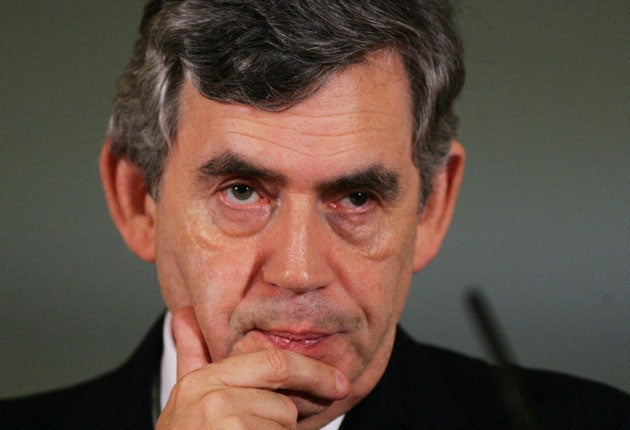Labour rebels call truce in their attempt to oust Brown

Your support helps us to tell the story
From reproductive rights to climate change to Big Tech, The Independent is on the ground when the story is developing. Whether it's investigating the financials of Elon Musk's pro-Trump PAC or producing our latest documentary, 'The A Word', which shines a light on the American women fighting for reproductive rights, we know how important it is to parse out the facts from the messaging.
At such a critical moment in US history, we need reporters on the ground. Your donation allows us to keep sending journalists to speak to both sides of the story.
The Independent is trusted by Americans across the entire political spectrum. And unlike many other quality news outlets, we choose not to lock Americans out of our reporting and analysis with paywalls. We believe quality journalism should be available to everyone, paid for by those who can afford it.
Your support makes all the difference.Rebel Labour MPs have called a "truce" in their battle to oust Gordon Brown because they fear a voter backlash if they undermine him during the global financial crisis. The tactical retreat by his critics is a boost for the Prime Minister on the eve of Labour's annual conference in Manchester starting today.
It came as he stressed his credentials to steer Britain through the economic storm and suggested that potential successors might not have the strength to do so.
Mr Brown told Sky News last night: "These are difficult times. Some people may think that, because of difficult times, they're not able to be as tough as I am on getting through them. That's their business." In a letter to all Labour MPs, he promised to take the "tough, decisive action" needed to get the financial system moving. "This week's international financial turbulence has shown that we are going through a period of extraordinary global change that is taking us into a new world," he said. His Labour critics admitted members of the public would turn against the party if it was seen to be destabilising a prime minister struggling to safeguard them during an economic crisis. "There is a truce," one said. "You can't try to wound a Prime Minister when the country is crying out for strong leadership."
It is unclear how long the ceasefire will last. Some backbenchers want to resume hostilities as soon as the conference ends. Others believe Mr Brown will come under renewed pressure after the Commons returns on 6 October, and hope he will be forced out by a cabinet mutiny if Labour loses the Glenrothes by-election, expected late October or early November.
However, if the financial turmoil has subsided by then, he could be safe until June next year. The trigger for removing him then could be poor results for Labour in European and local elections. Lord O'Neill of Clackmannan, a former Labour MP, said: "If we had a situation next June after the European elections that Labour was outed ... I suspect that there would be a change of leadership then."
Cabinet ministers issued a plea for unity on the eve of the conference. In an interview with The Independent, the Cabinet Office minister Ed Miliband said: "People must think very hard about the dangers of disunity. Disunity is a danger."
He insisted the Cabinet was behind Mr Brown, including his brother David, the Foreign Secretary and front-runner to succeed him as Prime Minister. "David is my best friend in politics and my best friend out of politics. I know he's supporting Gordon's leadership so our relationship is not difficult at all," he said.
Ministers claim the global crisis makes the case for a greater role for the state to combat market failures.
John Denham, the Skills Secretary, will tell a rally tomorrow: "We have got into a terrible mess by counterposing ideals like individual aspiration, or choice in public services, with the virtues of social solidarity and collective strength ... trying to tailor individual policies to different groups of voters is a political dead end. Our core values are the values of the vast majority of the British people."
Join our commenting forum
Join thought-provoking conversations, follow other Independent readers and see their replies
Comments